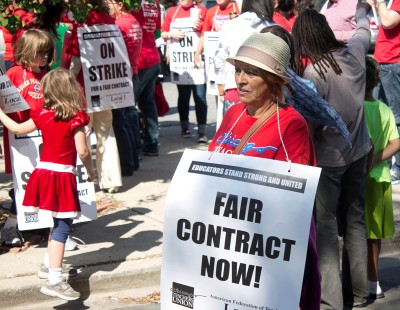The teacher strike in Chicago, now in its second week, has become a national symbol in the ongoing debate about the future of public education in this country.
Teacher union leaders and district officials reached a tentative compromise on Friday afternoon, after drawn-out negotiations over compensation, the length of the school day and teacher evaluations. But when union delegates met Sunday, many were unwilling to vote in favor of the deal, because they either opposed it outright or wanted more time to go over the details.
Chicago Mayor Rahm Emanuel is seeking a legal injunction to end the strike in the nation’s third largest school district on the grounds that “it was called over issues that teachers are not legally permitted to strike about and that it endangers the health and safety of children,” according to The New York Times.
“I will not stand by while the children of Chicago are played as pawns in an internal dispute within a union,” Emanuel said in a statement. “This was a strike of choice and is now a delay of choice that is wrong for our children.”
As the strike continues, parents, teachers, experts and advocates in Chicago and around the country are weighing in. Some, like former District of Columbia Public Schools Chancellor Michelle Rhee, take Emanuel’s side.
Teacher effectiveness
At the core of the Chicago strike are issues over tying teacher evaluations to student test scores.
Such measures are part of a national push to improve teacher effectiveness and something The Hechinger Report has been reporting on for several years. We’ve looked at how recent high-profile efforts to improve teachers are impacting the classroom and educators in states like Florida, Tennessee, Wisconsin and Indiana as well as nationwide.
“We heard a lot of talk from union leadership about fewer students in each classroom, about improving training, and about the very real challenges teachers face. But by extending the strike tonight, the union proved that this wasn’t about addressing any of those issues,” Rhee, founder and CEO of StudentsFirst, a group that aims to mobilize parents and to serve as a political counterweight to unions, said in a statement. “It’s clear this was only about job security and compensation for union members.”
Terry Moe, a professor at Stanford University and author of Special Interest: Teachers Unions and America’s Public Schools, wrote an op-ed for CNN similarly arguing that the strike—and collective bargaining in general—is harmful to Chicago’s school children.
“The purpose of the Chicago school system—and of the American school system more generally—is to educate children,” Moe wrote. “The way to assess collective bargaining is not to ask whether it works to bring labor peace. It is to ask whether it promotes the interest of children in a quality education. And the answer to that question is no, it does not. Not even remotely.”
Education historian Diane Ravitch argued last week on NPR, though, that the strike was a way to ultimately help children. “I think the union has a vision of a school system that has the kind of resources where children get what they actually need,” she said on The Diane Rehm Show Wednesday. “[The strike] has to do with all the specific issues, but with a larger vision of what’s the best kind of education for children.”
Teachers union members across the country have thrown their support behind their striking peers. Emanuel pointed to the Boston Teachers Union, which recently finished its own tense negotiations over a new evaluation system without striking, as an example the Chicago union should follow.
In response, the Boston union took out a full-page ad in the Chicago Sun-Times to publish a letter to Emanuel. “Thank you for mentioning our contract settlement, which came about as a result of a mutually respectful conversation between the parties,” the union wrote. “Perhaps you can learn from us—and begin to treat your own teaching force with the same respect.”
Saturday, teachers from Wisconsin, Minnesota and other states came to Chicago to lend their support to teachers in a rally.
And the union says it’s receiving a great deal of parental support as well. A poll released last week found that 55.5 percent of parents supported the union’s decision to go on strike, while 40 percent opposed it.
For other parents, frustration grew as the week went on. “Our kids were being used as leverage,” Chicago parent Humberto Ramirez told The Chicago Tribune. “I certainly don’t begrudge any benefits of salaries the [teachers union] has been able to negotiate, but [they] put so many people in a terrible inconvenience simply because they have this grand union agenda.”




